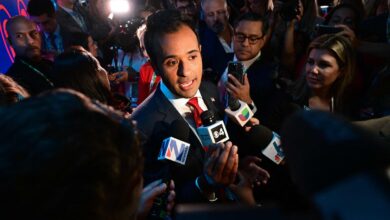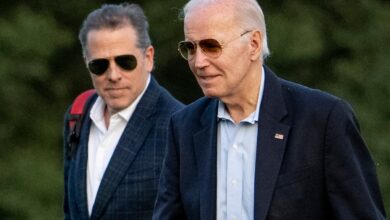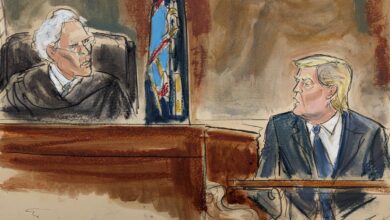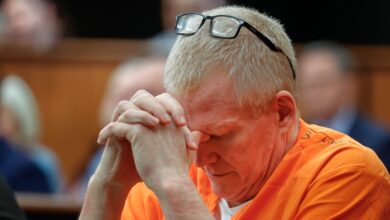Isis on trial: Families of victims hope for justice as landmark case of Isis ‘Beatle’ begins in US court
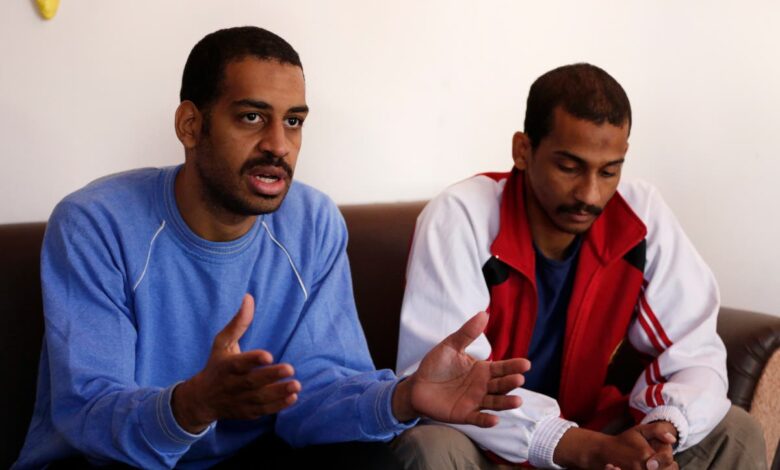
They were the public face of the most notorious terrorist organisation in modern history: Four British citizens who left their homes to join Isis in Syria, where they were accused of kidnapping, torturing and ultimately murdering Western hostages, all the while broadcasting their crimes to the world. ‘The Beatles,’ as they were known, came to symbolise the group’s extreme brutality.
Now, for the first time, a member of the group is set to stand trial in a US courtroom. El Shafee Elsheikh, 33, will face a jury at a federal court in Alexandria, Virginia on charges of hostage-taking and conspiracy to murder.
The case is focused on his alleged role in the murder of four Americans: journalists James Foley and Steven Sotloff, and aid workers Kayla Mueller and Peter Kassig. The indictment also holds him responsible for the deaths of British aid workers David Haines, 44, and Alan Henning, 47.
Elsheikh is the most senior Isis figure to face the US justice system. His trial – perhaps the most significant terrorism trial of the decade – could provide an insight into the inner workings of the group, its crimes, and its secrets. It will also be an opportunity for the families of the victims to face a man who transformed their lives forever.
Diane Foley, the mother of journalist James Foley, said accountability was “essential” in helping victims’ families heal.
“So often, hostage-takers are never held accountable,” she told The Independent ahead of the trial. “It’s taken a lot to bring these men here and I’m hoping that it’ll send a message. I know it’s only one step, but to me it’s a big step.”
“A trial is a much more positive way to get accountability than a drone strike. Violence begets violence, in my opinion. This is fairer and more transparent,” she added.
James Foley, ‘Jim’ to his friends and family, was a former teacher turned freelance journalist who went to Syria to report on the impact of the war on civilians. He was kidnapped in November 2012 in northern Syria, and killed two years later.
Mrs Foley, who has been an active campaigner for the plight of hostages since the death of her son, and started a foundation in his name, said the trial may also be an opportunity for lingering questions to be answered.
“I hope he’ll also point fingers at others who are culpable. I fear there are a lot of folks involved in the kidnapping, torture and ultimate death of the Americans and British, who are lurking who knows where, in Syria or Germany, or wherever they might be.
“Some families also are really hoping that we might find the remains of loved ones,” she added.
Elsheikh was born in Sudan and grew up in Shepherd’s Bush, London. He went to Syria in 2012 with his friend Alexanda Kotey, where they joined an affiliate of Al Qaeda. Later, the pair would swear allegiance to Isis and join up with fellow Brits Mohammed Emwazi and Aine Lesley Davis. The four would form the terror cell that became known as The Beatles, a nickname given to them by their hostages because of their British accents.
Emwazi was perhaps the most infamous of the group, and thought to be the ringleader. Known as ‘Jihadi John,’ he carried out the beheadings of Foley, Sotloff, and British citizens David Haines and Alan Henning — acts which Isis filmed and released in propaganda videos.
The four were accused of involvement in the kidnapping of at least 27 people in Syria between 2012 and 2015, most of them Westerners. The US Justice Department said Elsheikh, Kotey and Emwazi supervised detention facilities where hostages were held, where they engaged in a” prolonged pattern of physical and psychological violence” against captives.
Former hostages who escaped or were released testified to the brutality of their captors.
French journalist Didier Francois, who was held by Isis for 10 months until his release in 2014, once described Elsheikh as “an absolute psychopath”. He told French radio station Europe 1 that ‘The Beatles’ were “our most violent guards, keen on systematic torture and partial to techniques such as drowning and suffocation but not only. They also loved mock executions and crucifixions.”
According to the US State Department, Elsheikh “earned a reputation for waterboarding, mock executions and crucifixions while serving as an Isis jailer.”
Elsheikh is also charged with coordinating the Western-hostage ransom negotiations by email.
The Obama administration launched at least one operation to rescue American hostages held by Isis, but was ultimately unsuccessful. Some European hostages were released after their government paid ransoms, but both the US and UK governments have a longstanding policy to not pay ransoms to terrorist groups.

